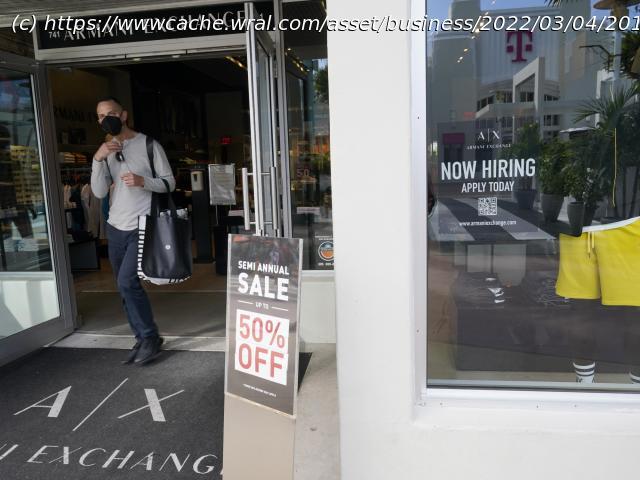In a buoyant sign for the U.S. economy, businesses stepped up their hiring last month as omicron faded and more Americans ventured out to spend at restaurants, shops and hotels despite surging inflation.
WASHINGTON — In a buoyant sign for the U.S. economy, businesses stepped up their hiring last month as omicron faded and more Americans ventured out to spend at restaurants, shops and hotels despite surging inflation. Employers added a robust 678,000 jobs in February, the largest monthly total since July, the Labor Department reported Friday. The unemployment rate dropped to 3.8%, from 4% in January, extending a sharp decline in joblessness to its lowest level since before the pandemic erupted two years ago. Friday’s hiring figures were collected before Russia’s invasion of Ukraine, which has sent oil prices jumping and has heightened risks and uncertainties for economies in Europe and the rest of the world. Yet the February hiring data suggest that two years after COVID-19 sparked a nationwide shutdown and 22 million job losses, the disease is losing its grip on America’s economy. More people are taking jobs or searching for work — a trend that, if it endures, will help ease the labor shortages that have bedeviled employers for the past year. In addition, fewer people are now working remotely because of the disease. A continuing flow of people back to offices could boost employment in urban downtowns. And the number of Americans who are delaying job hunts for fear of the disease fell sharply from January, when omicron was raging, to February. “All signs are that the pandemic is easing its hold on jobs and the economy,” said Jane Oates, president of WorkingNation and a former Labor Department official. “Very strong numbers in very uncertain times.” Other recent economic data also show the economy maintaining strength as new COVID infections have plummeted. Consumer spending has risen, spurred by higher wages and savings. Restaurant traffic has regained pre-pandemic levels, hotel reservations are up and far more Americans are flying than at the height of omicron. Still, escalating costs for gasoline, wheat and metals such as aluminum, which are exported by both Ukraine and Russia, will likely accelerate inflation in the coming months. Higher prices and anxieties surrounding the war could slow hiring and growth later this year, though economists expect the consequences to be more severe in Europe than in the United States. Inflation has already reached its highest level since 1982, with price spikes especially high for such necessities as food, gasoline and rent.






